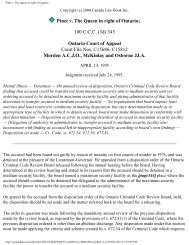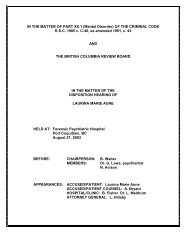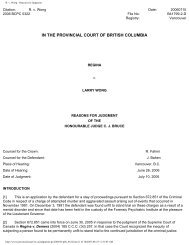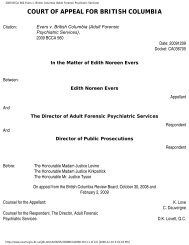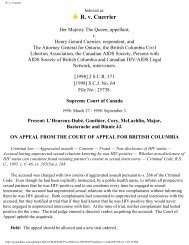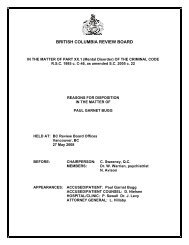R. v. CONWAY - British Columbia Review Board
R. v. CONWAY - British Columbia Review Board
R. v. CONWAY - British Columbia Review Board
You also want an ePaper? Increase the reach of your titles
YUMPU automatically turns print PDFs into web optimized ePapers that Google loves.
L’Heureux-Dubé J., relying on Slaight and Roncarelli v. Duplessis, [1959] S.C.R. 121 among others,<br />
concluded that statutory discretion must be exercised in accordance with the boundaries imposed<br />
by the statute, the principles of the rule of law and of administrative law, the fundamental values of<br />
Canadian society, and the principles of the Charter (paras. 53 and 56).<br />
[47] The following year, in Blencoe, the Court was asked to determine whether the<br />
provincial Human Rights Commission was subject to the Charter. Bastarache J., writing for the<br />
majority, explained that Slaight guaranteed that statutory bodies like the Commission are bound by<br />
the Charter even if they are independent of the government and/or exercising adjudicatory functions:<br />
The facts in Slaight and the case at bar share at least one salient feature: the labour<br />
arbitrator (in Slaight) and the Commission (in the case at bar) each exercise<br />
governmental powers conferred upon them by a legislative body. The ultimate source<br />
of authority in each of these cases is government. All of the Commission’s powers are<br />
derived from the statute. The Commission is carrying out the legislative scheme of the<br />
Human Rights Code. It is putting into place a government program or a specific<br />
statutory scheme established by government to implement government policy. . . . The<br />
Commission must act within the limits of its enabling statute. There is clearly a<br />
“governmental quality” to the functions of a human rights commission which is created<br />
by government to promote equality in society generally.<br />
Thus, notwithstanding that the Commission may have adjudicatory characteristics,<br />
it is a statutory creature and its actions fall under the authority of the Human Rights<br />
Code. The state has instituted an administrative structure, through a legislative scheme,<br />
to effectuate a governmental program to provide redress against discrimination. It is the<br />
administration of a governmental program that calls for Charter scrutiny. Once a<br />
complaint is brought before the Commission, the subsequent administrative proceedings<br />
must comply with the Charter. These entities are subject to Charter scrutiny in the<br />
performance of their functions just as government would be in like circumstances. To<br />
hold otherwise would allow the legislative branch to circumvent the Charter by<br />
establishing statutory bodies that are immune to Charter scrutiny. The above analysis<br />
leads inexorably to the conclusion that the Charter applies to the actions of the



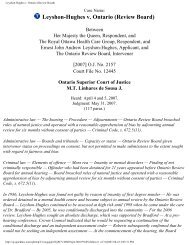
![LaFortune [LaFortunate] (Re) - British Columbia Review Board](https://img.yumpu.com/42779845/1/190x245/lafortune-lafortunate-re-british-columbia-review-board.jpg?quality=85)
